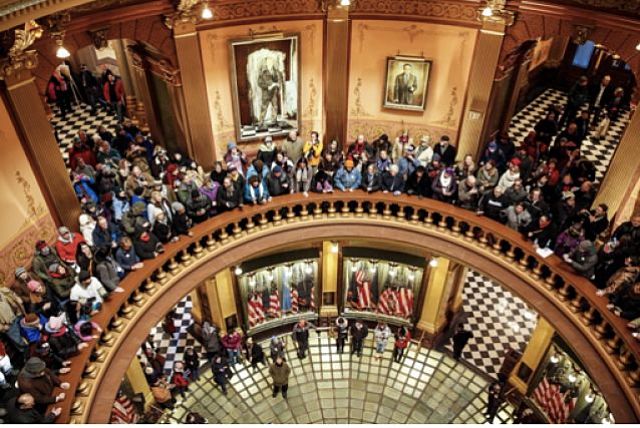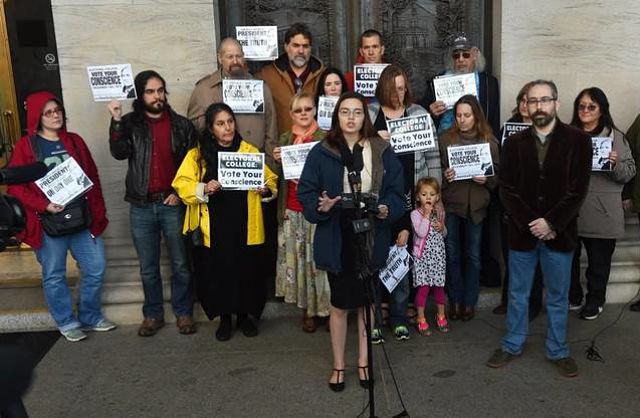 Protestors fill the rotunda of the Michigan State Capitol in Lansing, Michigan before the state electoral college met to approve the results of this year's presidential election on December 19th, 2016. (Getty Images)
Protestors fill the rotunda of the Michigan State Capitol in Lansing, Michigan before the state electoral college met to approve the results of this year's presidential election on December 19th, 2016. (Getty Images)
December 19, 2016
With electoral college vote, Trump’s win is official
In Florida, a crucial swing state where Trump defeated Clinton by about a percentage point, Trump won all 29 electoral votes. He also earned all 16 votes in Michigan, another state that flipped to Republicans for the first time since 1988.
On the streets of Washington, D.C., two dozen protesters assembled outside Trump’s hotel on Pennsylvania Avenue, singing songs such as “We Shall Overcome.” Some held signs, including one that read, “Resist Putin’s Puppet.” The District’s three electors later gathered at city hall, just a block from Trump’s hotel.
In Albany, N.Y., former president Bill Clinton sat in the state Senate chamber as an elector and cast one of the Empire State’s 29 electoral votes for his wife.
“I’ve never cast a vote I was prouder of,” he told reporters after the meeting.
Despite the pleas of Trump opponents, most electors had said for weeks that they planned to cast votes reflecting the will of their home states.
Read more at The Washington Post »
—
Related:
In Theory US Electoral College is Not Rubber Stamp for Election Results

Washington state Presidential Electors Levi Guerra and Bret Chiafalo (right) speaking in front of the Legislative Building in Olympia, Washington. (AP photo)
Tadias Magazine
By Tadias Staff
Published: Sunday, December 18th, 2016
New York (TADIAS) — On Monday, December 19th, the U.S. Electoral College will meet in various states to approve the results of the 2016 presidential election. In the past few weeks the electoral college system has gained international attention as people around the world curiously observe that only in America can a presidential candidate lose the popular vote by nearly 3 million ballots and still win the general election. In addition, there is also the brewing high-tech spy scandal in which a foreign power, no less than America’s long adversary, Moscow, clearly messed with this year’s election in favor of the President-Elect, generating an intense public discussion in the United States as to the exact role of the Electoral College, which today is seen as a highly partisan process.
Although it’s unlikely to succeed “pressure on members of the electoral college to select someone other than Donald Trump has grown dramatically — and noisily — in recent weeks, causing some to waver but yielding little evidence that Trump will fall short when electors convene in most state capitals Monday to cast their votes,” the Washington Post reports.
The newspaper features a group known as the Hamilton Electors — whose members include Mark Hersch, a 60-year-old Chicago-based marketing strategist — “who have been organizing efforts to contact electors and change their minds. Rather than persuade an entire country, he and his allies must find 37 Republicans willing to vote for someone else, a tipping point at which the responsibility of picking the president would shift to the U.S. House of Representatives. No one knows for sure how many are considering alternate votes; estimates vary from one to 25.”
One of America’s renowned statesman and founding fathers, Alexander Hamilton, once famously explained “The Mode of Electing the President” in the historic Federalist Papers published in 1788, stating that the purpose of the Electoral College is to make sure “that the office of President will never fall to the lot of any man who is not in an eminent degree endowed with the requisite qualifications.”
Hamilton also argued that another important purpose of the Electoral College was to safeguard against foreign interference in the United States election system and “chiefly from the desire in foreign powers to gain an improper ascendant in our councils.”
The Washington Post article also quotes a Republican operative and attorney from Massachusetts, R.J. Lyman, as emphasizing that the electoral college was “not intended to be a rubber stamp” and that otherwise “the Founding Fathers would have tasked the responsibility to a clerk or simply used the popular vote as a way of choosing a president.’”
“I’m reminding them of their duty to think about their choice in a way that’s consistent with their conscience and the Constitution,” Lyman told the Washington Post. “So far, Lyman said, he has identified 20 electors who might be willing to vote “other than their party pledge.” He couldn’t name more than one publicly but insisted that more were out there.”
Watch: How the US Electoral College works
According to Hamilton the electoral college was designed so that “we may safely pronounce, that the true test of a good government is its aptitude and tendency to produce a good administration.”
—
Related:
In last-shot bid, thousands urge electoral college to block Trump at Monday vote
The Federalist Papers : No. 68: The Mode of Electing the President
Join the conversation on Twitter and Facebook.

























